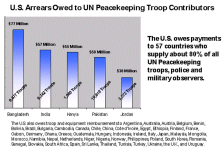UN Peacekeeping: A Bargain and an Opportunity
Testimony by Timothy E. Wirth
President, The United Nations Foundation
and The Better World Fund
June 13, 2007
Committee on Foreign Affairs
Subcommittee on International Organizations, Human Rights and Oversight
U.S. House of Representatives
Washington, DC
Thank you, Mr. Chairman, Members of the committee - I'm pleased to be with you again, and to return to these familiar surroundings.
Your panel today includes some of the country's most distinguished UN peacekeeping analysts; I am honored to be included with them, but would not number myself on a list of experts. Rather, Mr. Chairman, my job (and that of the United Nations Foundation) is to support the UN and UN causes: to help strengthen the UN, to tell its story, to help with its important reform efforts, and to support its many global causes. It is a privilege to be engaged in such a mission, and to share with you our perspective on UN peacekeeping and the important U.S.-UN relationship.
Fundamentally, Mr. Chairman, the UN works where the U.S. wants it to. The UN has always been a key element of U.S. foreign policy, and when the U.S. pays attention and pays its bills, the UN is both a bargain and an opportunity - of special note is peacekeeping, which is a great success story for the UN, and could and should be seen as one for the U.S. as well.
Let me briefly elaborate. One constant of the U.S.-UN relationship has been the consistently strong public support for the UN during its 60 years. The U.S. was the driving force behind the UN's establishment, is its host, its most generous financial supporter, and I would argue, its greatest beneficiary. Opinion polls show that Americans value the UN, see it as an important vehicle for sharing the burdens of American responsibilities around the world, and with characteristic skepticism of government, Americans want the UN to continue to reform and renew itself to become a stronger, more effective institution.
If this consistent public support for the UN is a familiar variable in the U.S.-UN relationship, the centrality of the UN to U.S. global interests has only grown. In 2007, the UN is deeply involved in almost every contemporary global issue, in addition to the subject of today's hearing: peacekeeping and the dangerous proliferation of failed states, the cancer of destructive non-state actors, and the spread of genocidal events. In a remarkable growth of expectations and aspirations, the UN is now deeply engaged in nearly every major global challenge of concern to the United States:
- Stability in the Middle East and the Balkans,
- Poverty alleviation and development, especially in Africa,
- Global disease, from the catastrophe of AIDS to the prospect of bird flu,
- Climate change, with its concomitant economic, political, and environmental components,
- Emerging humanitarian crises, from refugee flows out of Iraq to natural disasters like the 2005 tsunami.
The UN is central to these issues, and therefore central to U.S. interests.
Today's panel highlights the successes and challenges of peacekeeping, the biggest, most resource-intensive, most visible, and fastest growing operational component of the U.S.-UN relationship. As you know, Mr. Chairman, within the last year or so the U.S. and the UN have called and voted for:
- A new peacekeeping mission in Somalia;
- A seven-fold expansion of the UN's peacekeeping mission in Lebanon;
- The expansion of Sudan's peacekeeping mission into Darfur;
- Reauthorization of the UN's peacekeeping mission in Haiti;
- A renewed peacekeeping mission for East Timor; and
- New missions in Chad, the Central African Republic, and Nepal.
The discussion today highlights six key aspects of the U.S.-UN relationship in UN peacekeeping:
Burden Sharing. UN peacekeeping brings two types of burden sharing to the table. The first is of vital importance to American taxpayers, and that is financial burden sharing. When the U.S. puts 25 cents towards a UN peacekeeping mission, the rest of the world adds 75 cents. By any yardstick, that is a heck of a deal. Imagine only what the financial cost would be if the U.S., for example, were to be unilaterally engaged in peacekeeping in Lebanon right now. Second and also of great importance is the fact that UN peacekeeping helps keep American soldiers out of harms way. The UN today has more than 100,000 troops and personnel deployed around the world - almost none of whom are Americans.
Cost Effectiveness. UN Peacekeeping is also highly cost effective. As you will hear, the Government Accountability Office performed a cost comparison of U.S. and UN-led peacekeeping in Haiti and found that - between the financial contributions of other countries and leaner deployments - UN peacekeeping was at least eight times less expensive than fielding an American force. And for one more cost comparison - the United States has already spent more money this week in Iraq than we'll spend all year on UN peacekeeping.
The Need for Continued Reform: Peacekeeping is probably the most important laboratory for UN reform. Progress has been made, and important further recommendations have been proposed by the new Secretary-General. These will require persistent, diplomatic support from the U.S., and the new U.S. Permanent Representative has made an impressive start.
Global Re-engagement: Americans also see peacekeeping as an important avenue for re-engaging with the rest of the world. Some powerful new data makes this case: Some weeks ago, we joined a small group of organizations to launch what we thought would be a modest grassroots initiative called "The Price of Peace" Campaign. Designed to highlight the low cost of investing in UN peacekeeping, the campaign has spread rapidly and has become an almost organic movement: more than 28,000 people from all 50 states have signed an online petition calling for full U.S. funding of UN peacekeeping obligations in FY 2008. I am certain that all members of this Committee have received these appeals for full U.S. engagement, and for the U.S. to pay its share.
Planning for the Future: The growth in both the size and importance of UN peacekeeping logically leads to a re-examination of the role that the U.S. agrees to play in it, and how the U.S. should be planning for the future. Perhaps this Committee should be asking the State Department and DOD to provide their best thinking about future operations: Should the U.S. expand its headquarters, logistical and communications contributions? Should the U.S. train a broader cadre for humanitarian management and engagement? What responses will be required for anticipated global flows of refugees resulting from rising sea levels, and what institutional strengthening will be needed to cope with new pandemics like bird flu?
Iraq: The event you can probably most anticipate is the phase-out of the U.S. presence in Iraq. What will this development require from the United Nations, and is Congress using its oversight authority to be sure that this thinking has begun, and that the necessary organizational and budget changes are being prepared?
Finally, Mr. Chairman, let me speak to the budget crisis which the United States is currently inflicting on the UN, and on some of our closest friends and allies around the world. As we sit here today, the U.S. is on the verge of passing the billion dollar mark in permanent debt to the United Nations and its member states for peacekeeping alone.
As of June 2007, the U.S. was $569 million in permanent arrears to the United Nations for UN peacekeeping. This debt was left unaddressed in the Administration's FY 2008 budget. In fact, it was exacerbated when the Administration's budget request for the UN peacekeeping account in FY 2008 was found to be short by an additional, estimated $500 million. If this is left unaddressed, U.S. arrears to the UN will exceed $1 billion by the end of 2007 for peacekeeping alone.
It is welcome news that the Appropriations Committee in the House is doing what it can to minimize this 2008 shortfall. But until we fully fund this account and erase our debt, it will be absorbed by allies that are providing troops for these U.S.-endorsed missions - notably, India, Kenya, Pakistan, and Bangladesh.
The U.S. has sponsored and supported every peacekeeping operation - Haiti, Congo, Lebanon, Liberia, Kosovo - all operations deemed to be in the U.S. national interest. We could have vetoed any one of them, but we didn't: Richard Holbrooke, John Negroponte, Jack Danforth, and John Bolton all voted "Yes" when these operations came before the Security Council.
But the U.S. has refused to pay the bill, and the impact of shortfalls in this year's proposed budget would be a deficit of more than a billion dollars.
Where will the billion dollars come from? The UN doesn't have some reserve to dip into-and this debt is huge: it is 20% of the UN's total peacekeeping budget for 2008, and 13% of the UN's total central budget. It is a big number.
The UN doesn't have a bank it can go to for financing. Instead, the Secretary-General has to go to other member states and ask them to pony up. The methodology for getting others to pay is simple: the UN just doesn't pay those who have agreed to send their own troops and ship their own equipment in support of new peacekeeping operations - they are left holding unpaid invoices.
Attached to my testimony, and on the chart behind me, is a list of the countries that, in effect, are financing the U.S. debt to the UN - it is a pretty startling list. For example:
- India and Pakistan, close friends of the U.S. and two of the most reliable providers of UN peacekeeping help, are together owed more than $109 million because the U.S. doesn't pay its bills;
- Bangladesh, one of the poorest countries in the world, is owed $77 million because the U.S. is the UN's biggest debtor;
- Nigeria has been the most dependable and far-reaching face for stability in Africa, and is owed $3.4 million;
- Brazil, our very close friend, is owed $7.2 million for its peacekeeping efforts in Haiti, 90 miles off our coast.
Mr. Chairman, this is simply an unacceptable situation. Some of the poorest countries in the world, some of our closest allies, and some of the world's most dependable global citizens, are owed millions and millions of dollars because the United States votes for these important peacekeeping missions, but won't pay its share. This is wrong, Mr. Chairman. Great nations keep their word and pay their bills. It doesn't make sense to turn our backs on this bargain. It is not in the U.S interest and it does nothing to help our reputation in the world.
I hope the committee will move rapidly to reverse this situation. Paying what it owes will make a significant contribution to U.S. re-engagement in the world, reinforce the basic support of the American people, and provide additional leverage for continuing reform at the UN.
Thank you, and I look forward to answering any questions that you may have.




